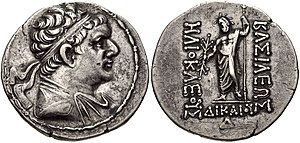Heliocles I

Obv: Bust of Heliocles
Rev: Zeus standing, with thunderbolt and sceptre. Greek legend: ΒΑΣΙΛΕΩΣ ΔΙΚΑΙΟΥ ΗΛΙΟΚΛΕΟΥΣ Basileos Dikaiou Heliokleous, "Of King Heliocles the Just".

Obv: Bust of Heliocles helmetted and in uniform.
Rev: Zeus standing, with thunderbolt and sceptre. Greek legend: ΒΑΣΙΛΕΩΣ ΔΙΚΑΙΟΥ ΗΛΙΟΚΛΕΟΥΣ Basileos Dikaiou Heliokleous, "Of King Heliocles the Just".

Heliocles I (Ancient Greek: Ἡλιοκλῆς, romanized: Hēlioklēs, meaning "glory of Helios"; reigned 145–120 BC) was a Greco-Bactrian king, brother and successor of Eucratides the Great, and considered the last Greek king to reign over the Bactrian country. His reign was a troubled one; according to Roman historian Justin, Eucratides was murdered crossing the Hindu Kush by one of his sons, although this is highly disputed and Justin fails to name the perpetrator. Eucratides’ death led to instability, even civil war, which caused the Indian parts of the empire to be lost to Indo-Greek king Menander I and southern Bactria to be lost to the Yuezhi.
Yuezhi invasion
From 130 BC a nomadic people, the Yuezhi, started to invade Bactria from the north and we could assume that Heliocles was killed in battle during this invasion. Details from Chinese sources seem to indicate that the nomad invasion did not end civilisation in Bactria entirely. Hellenised cities continued to exist for some time, and the well-organised agricultural systems were not demolished.
The Yuezhi would copy and adapt the coin types of Heliocles for a long time.
References
- The Shape of Ancient Thought. Comparative studies in Greek and Indian Philosophies by Thomas McEvilley (Allworth Press and the School of Visual Arts, 2002) ISBN 1-58115-203-5
- Buddhism in Central Asia by B. N. Puri (Motilal Banarsidass Pub, January 1, 2000) ISBN 81-208-0372-8
- The Greeks in Bactria and India, W. W. Tarn, Cambridge University Press.
